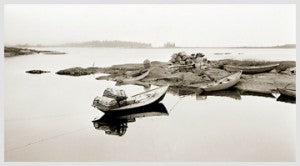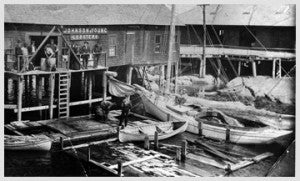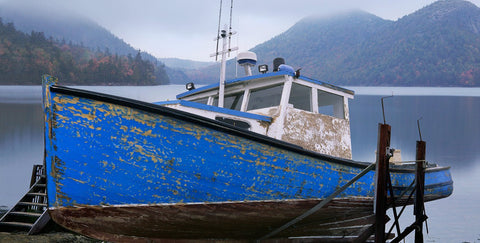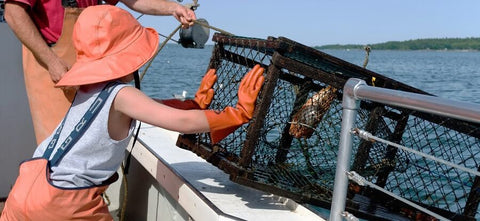The lobster boat is a recognizable image that people all across the country associate with Maine. It’s a symbol that has evolved over time but still always kept the same meaning of hard work, simplicity, and our way of life here in Maine. The lobster boat portrays a strong image of our history in the lobster industry and an image that is so unique to us here in Maine, that sometimes that’s all people from other places associate us with (which we don’t mind!) If you’ve ever visited the Portland, Maine waterfront or any of the other lobstering towns in Maine you’ll be able to pick out dozens of these vessels and find yourself fascinated just by looking at them. Each boat is different, and just by looking at one for a couple of minutes you can form a story of your own of the men and women on board. Each boat is unique to them, the name of the boat, the buoys, the scratches, paint chips, and traps all contribute to that particular story and history of that boat. That’s why the evolution and history of this famous boat is so important and intriguing in this industry and to all those that love those little creatures they catch! The first mention of the lobster boat was in the Boston Gazette in 1726, but the boat itself dates back much earlier. Powered by an oar and sail, the first lobster boat was nicknamed the “Yankee invention” but was formally called The Dory. Pictured below, The Dory was used in almost all fisheries and other sorts of waterfront occupations. It was built in both slab and round sided styles with a flat bottom. This was truly an American product, and just by looking at the picture below you get a sense of the salty-haired, bearded men boarding this small boat out in all types of weather determined to catch the lobsters that provided for their families.

The next lobster boat developed resembled a little tiny garden vegetable, and for that was named The Pea Pod. This was a double ended boat, and looked just like a pod split open down the middle of the seam with the peas removed. The Pea Pod could be rowed in both directions, and its shallow design and ease of movement made it easy to navigate the rocky coastline. This design was mostly used for in-shore lobster fishing. Today, The Pea Pod is still in use but has found new purpose as a family pleasure boat because of its good lines, easy handling and excellent performance. The Friendship Sloop was a boat that still holds glory today. Dating back to the 1850s, these boats were the most popular work boat on the Maine coast before lobster boats were revolutionized by the gas engine. This was an inexpensive boat to make and they were crafted all along the Maine coast, they were a fixture in the harbors. The Friendship Sloop could hold double the cargo of The Pea Pod and was much easier to maneuver, typically it only took one lobsterman to haul in traps. Today, the Friendship Sloop continues to awe people all over. The beauty and history of this boat lives on in The Friendship Sloop Society in Rockland, Maine.

Then came gasoline engines, which of course changed the way boats were made and the way lobsterman fished. The gas engine was first put in a style of lobster boat called The Hampton, which had a tight turning radius that was a must-have for the waters of Casco Bay here along the Maine coast. With gas engines came Torpedo Boats and The Brimstone. Both were more slim, sleek, and faster than previous boats and became a need for lobsterman throughout New England. They were efficient boats that were light, but tough and could weather rough seas. The main benefit of introducing the gas engine to the lobster boat was it allowed the lobstermen to venture farther from shore all year round, and they could use the power to haul up traps instead of doing in manually. Nowadays, we use lobster boats which can sometimes be referred to as Man O War boats. They straddle the line between a working commercial lobstering boat and a pleasure-boating lobster yacht. This boat has higher horsepower, radar, radio systems, depth sounder, and other essential technical equipment. They, of course, carry more traps, can travel farther and can travel speeds greater than 40mph. These will be the boats you see housing themselves along the waterfront today. Lobstering has such a deep and colorful history here in Maine. That rich history adds other interesting avenues to explore, like the Maine lobster boat. Through its history it has provided the way we retrieve our beloved lobster and a way of life for so many families here in Maine. When picturing a lobster boat, you not only picture its unique design and strangely beautiful details but the back story behind every boat and that back story begins with this evolution of such a historic Maine symbol. http://www.maineboats.com/online/boat-features/evolution-maine-lobsterboat http://www.gma.org/lobsters/boats.html



